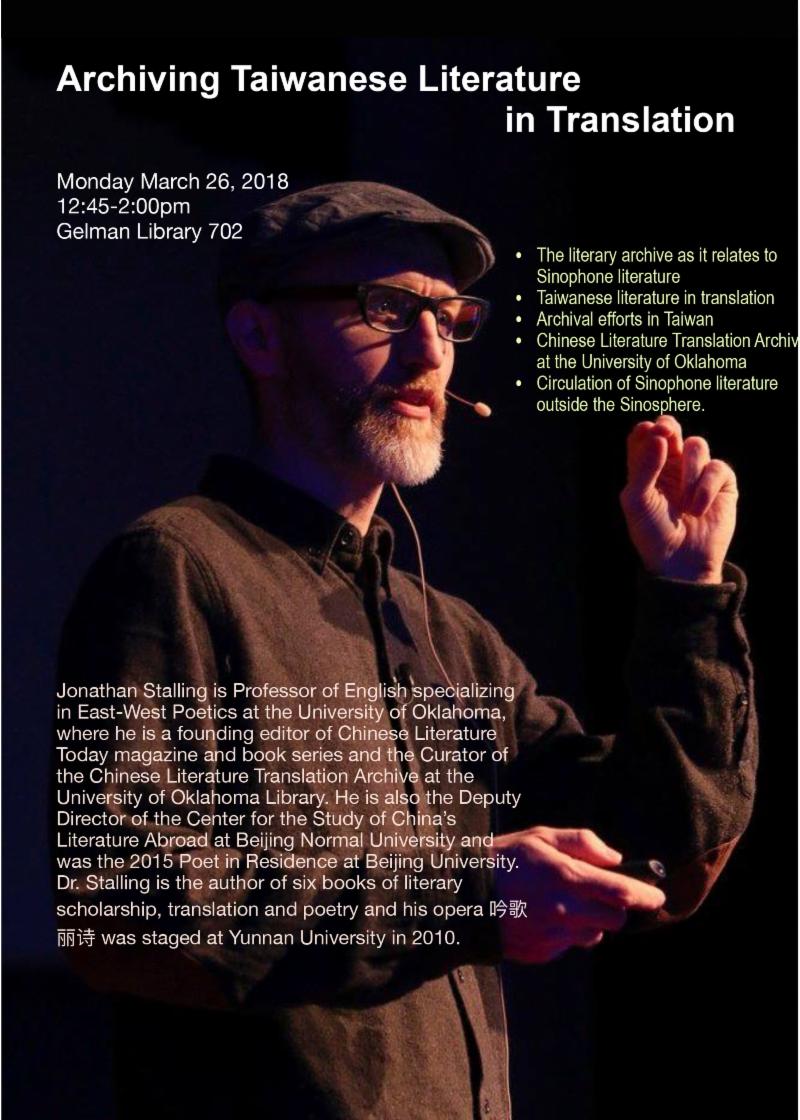Audio Recording Part 1
Audio Recording Part 2
Audio Recording Part 3
Monday, March 26, 2018
12:45 PM – 2:00 PM
Gelman Library, Room 702
2130 H St. NW
Washington, DC 20052

You are invited to join us for a discussion with Dr. Jonathan Stalling on the topic of “Archiving Taiwanese Literature in Translation.” Dr. Stalling will cover topics including:
* The literary archive as it relates to Sinophone literature
* Taiwanese literature in translation
* Archival efforts in Taiwan
* Chinese Literature Translation Archive at the University of Oklahoma
* Circulation of Sinophone literature outside the Sinosphere
And much more! Please come and join the discussion. This event is on the record and open to the media.
About the speaker:
 Dr. Jonathan Stalling is Professor of English specializing in East-West Poetics at the University of Oklahoma, where he is a founding editor of Chinese Literature Today magazine and book series and the Curator of the Chinese Literature Translation Archive at the University of Oklahoma Library. He is also the Deputy Director of the Center for the Study of China’s Literature Abroad at Beijing Normal University and was the 2015 Poet in Residence at Beijing University. Dr. Stalling is the author of six books of literary scholarship, translation and poetry and his opera 吟歌 丽诗 was staged at Yunnan University in 2010.
Dr. Jonathan Stalling is Professor of English specializing in East-West Poetics at the University of Oklahoma, where he is a founding editor of Chinese Literature Today magazine and book series and the Curator of the Chinese Literature Translation Archive at the University of Oklahoma Library. He is also the Deputy Director of the Center for the Study of China’s Literature Abroad at Beijing Normal University and was the 2015 Poet in Residence at Beijing University. Dr. Stalling is the author of six books of literary scholarship, translation and poetry and his opera 吟歌 丽诗 was staged at Yunnan University in 2010.
This event is co-sponsored by GW’s Department of East Asian Languages and Literatures, the Sigur Center for Asian Studies, and the Taiwan Academy.



 Dr. Mikhail Pelevin is Professor of Iranian Philology at St. Petersburg State University (Russian Federation). His main area of research is the early modern Pashto literature conceptualized as the most distinct and expressive element of social culture and ethnic self-identification of Pashtuns in the transition period from the late Middle Ages to modern times. Among his publications in Russian are books Khushhal Khan Khatak (1613-1689): the Beginning of the Afghan National Poetry (2001), Afghan Poetry in the First Half and the Middle of the Seventeenth century (2005), Afghan Literature of the Late Middle Ages (2010); a new book The Khattaks’ Chronicle: the Corpus and Functions of the Text is coming soon. Few recent articles are available in English, e.g.: “The Beginnings of Pashto Narrative Prose” (2017), “Persian Letters of a Pashtun Tribal Ruler on Judicial Settlement of a Political Conflict”, 1724 (2017), Daily Arithmetic of Pashtun Tribal Rulers: Numbers in The Khataks’ Chronicle (2016), “Ethnic consciousness of Pashtun Tribal Rulers in Pre-modern Times” (2015). M. Pelevin teaches courses on Persian, Pashto, the history of Persian and Pashto literatures. His other academic interests include Iranian dialectology and Muslim law.
Dr. Mikhail Pelevin is Professor of Iranian Philology at St. Petersburg State University (Russian Federation). His main area of research is the early modern Pashto literature conceptualized as the most distinct and expressive element of social culture and ethnic self-identification of Pashtuns in the transition period from the late Middle Ages to modern times. Among his publications in Russian are books Khushhal Khan Khatak (1613-1689): the Beginning of the Afghan National Poetry (2001), Afghan Poetry in the First Half and the Middle of the Seventeenth century (2005), Afghan Literature of the Late Middle Ages (2010); a new book The Khattaks’ Chronicle: the Corpus and Functions of the Text is coming soon. Few recent articles are available in English, e.g.: “The Beginnings of Pashto Narrative Prose” (2017), “Persian Letters of a Pashtun Tribal Ruler on Judicial Settlement of a Political Conflict”, 1724 (2017), Daily Arithmetic of Pashtun Tribal Rulers: Numbers in The Khataks’ Chronicle (2016), “Ethnic consciousness of Pashtun Tribal Rulers in Pre-modern Times” (2015). M. Pelevin teaches courses on Persian, Pashto, the history of Persian and Pashto literatures. His other academic interests include Iranian dialectology and Muslim law.





